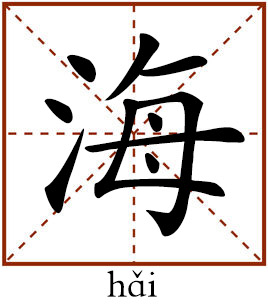Sea

This character refers to the sea. It is often used with characters such as ren (people), shu (book) or yun (cloud) to mean a vast expanse or quantity of something. In Chinese culture, it also symbolizes an open or a generous mind, tolerance or freedom.
海纳百川
hǎi nà bǎi chuān
Hai is the sea and na means to accept. Bai refers to one hundred and chuan refers to streams or rivers. This proverb, taken literally, means that the sea accepts hundreds of streams and rivers. It often means that an open-minded person can tolerate many things.
This proverb comes from a Chinese history book of the Eastern Han Dynasty (25–220), the Hou Han Ji (Annals of the Later Han) by the Eastern Jin scholar Yuan Hong (c. 328–c. 376). The original phrase in this book is “fang cun hai na,” stating that even a small space could contain something as vast as the sea. A Tang official named Li Zhouhan gave a commentary on the phrase—although the human body is small, the mind could be as boundless as the sea, which contains all the rivers and is never full. This proverb indicates that one should be as tolerant and broad-minded as the sea, and listen to different ideas or opinions just like the sea accepting all the rivers.
八仙过海,各显神通
bā xiān guò hǎi, gè xiǎn shén tōng
Ba xian refers to the Eight Immortals in Chinese mythology. Guo hai means to cross the sea. Ge xian shen tong means that each of them uses a magical object or power. The term, taken literally, means that the Eight Immortals use their own magical powers to cross the sea.
This term originated from a Taoist legend. One day, after attending a feast on the Penglai Island (a legendary land) in the Eastern Sea, the Eight Immortals decided to use their magical tools to cross the sea. Therefore, they cast spells to turn their tools into boats. Those tools included Lü Dongbin’s sword, Tieguai Li’s crutch (another version suggested that he used a gourd) and He Xiangu’s lotus flower. Nowadays, this term is often used as a metaphor, indicating that each member of a team use their own talent or skills to make a distinctive contribution to their collective success.
(edited by REN GUANHONG)

 PRINT
PRINT CLOSE
CLOSE